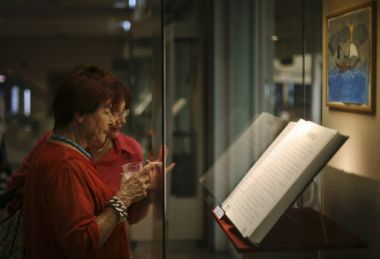Call for fairer treatment of evangelicals in Israel

The Secretary General of the World Evangelical Alliance, Dr Geoff Tunnicliffe, has called on Israeli and Palestinian government officials and representatives to do more to recognise evangelical Christian churches in the region.
In a speech he shared at the start of the recent Christ at the Checkpoint conference, Dr Tunnicliffe said: "While Christians in both Israel and Palestine have the freedom of worship there are still some significant injustices that need corrective action."
Rights and privileges often enjoyed by the more traditional denominations, such as the ability to hold officially recognised wedding ceremonies, arrange funerals, and other religious ceremonies and practices, are often denied to evangelical Christians.
"Evangelical Christians have dwelled in this land for many years and yet their churches do not have official recognition by the State. It is beyond time, that this recognition should be granted," said Dr Tunnicliffe.
The third 'Christ at the Checkpoint' conference was hosted by Bethlehem Bible College and looked at issues affecting Christians in the Holy Land and the importance of peace building.
Dr Tunnicliffe later met with the Palestinian Prime Minister and senior officials from the Israeli ministry of foreign affairs, as well as several Jewish scholars and Rabbis, in an effort to secure better recognition for evangelicals living in the Holy Land.
Earlier this week, Catholic leaders and the World Council of Churches (WCC) spoke out against a new Israeli law giving different status to Palestinian Christians.
The law creates separate representation on Israel's Advisory Committee for Equal Opportunity and defines Christian Palestinians who were in Israel during the war for independence in 1947-1948 as being 'non-Arabs'.
Senior officials from the Catholic Church in the Holy Land were quoted by Ekklesia as saying that the law created "a distinction between Christian and Muslim Palestinians".
They argue that this new law, introduced in late February, means that "Christian Palestinians are Christians and not Palestinians".
The distinction was one WCC General Secretary Dr Olav Fykse Tveit described as an "unacceptable severing of entire communities from their cultural identity".
CIA statistics estimate the current Christian population of the Palestinian occupied territories as around 123,000.
Dr Tveit criticised the plan because it creates a "legislative distinction between the indigenous Palestinian Arab Christians and Palestinian Arab Muslims, both of whom are citizens of the State of Israel".
called upon Israel to reverse the law and "stop an injustice against the Christian citizens of Israel", saying the Israeli Parliament "has transgressed all proper distinctions between state and religious authority by attempting to define the nature and character of Christian communities within Israel against their own will and self-understanding".
The law had also received condemnation from Arab members of the Israeli Parliament, who were quoted in the Al-Akhbar newspaper as saying the law was "racist" and part of a "divide-and-conquer" strategy.
Israeli Parliament member Hanin Zoabi of the Arab party, Balad, said "Colonialists try to separate groups of natives. The prime example of this is South Africa."
"We are the natives here and we have a clear identity, [we] are Palestinians, part of the Arab nation, and your law will fail. Part of the Zionist project is to oppress our identity, but I have the right to speak in the name of Palestinians."
Khalid Musmar, a Palestinian National Council offical, said in Al-Akhbar that:"The Palestinian Christian community will rebuke this before anyone else. The Palestinian Christians are Arab despite the wishes of anyone in the [Israeli Parliament] or otherwise.
"They have always said they were Arabs and have fought side-by-side with their Muslim brethren, from the times of the Crusades to today.
"The Palestinian community, in all its colours and creeds, is a unified Arab community confronting occupation. They are struggling for a Palestinian nation with Jerusalem as it's capital. This will not change by the acts of Knesset or anyone else."
However, chairman of the governing coalition in the Israeli Parliament, Yariv Levin was quoted in Al-Akhbar describing the law as "an important, historic step that could introduce balance to the State of Israel, and connect us [Jews] with the Christians".
"We and the Christians have a lot in common. They're our natural allies."
Catholic leaders in the Holy land are concerned that this is part of a campaign to draft Christians into the Israeli armed forces, in a similar way to how a recent law forced the previously exempt ultra-Orthodox Jewish community into military service.
Catholic officials quoted by Ekklesia said: "This campaign clearly has as its aim to divide Christians from their Muslim compatriots. However, it is equally dangerous because it will divide Christians among themselves even further."
Dr Tveit was less than impressed and called on WCC members to "raise this issue with representatives of Israel and with their own governments".











